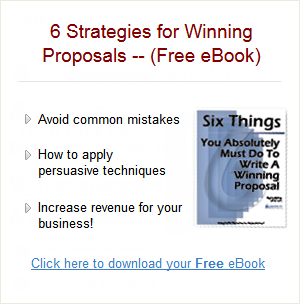Proposals take so much time to write-and time is often so short-that you are always sorely tempted to pull sections out of other proposals (ones that won and ones that didn’t), tweak them a bit and plug them into the current document. If you give in to this temptation, follow this advice: Be careful! Using
We all know that a picture is worth a thousand words. That’s as true in proposals as in any other document. Graphics can help you get across a complex set of ideas in a very compressed space. Evaluators like graphics that let help them see the points you are trying to make instead of making
Which section is the most important one in your proposal? Some will say it’s the offer itself-the product or service you are proposing to your customer. Others will say it’s the pricing section-what the service will cost the customer. I’ve heard compelling arguments that the Executive Summary (or the cover letter, if you choose to
A transition is way to move smoothly from sentence to sentence, paragraph to paragraph or section to section. It’s an indicator to the reader that what’s about to be said is related to what you just said. You can use one-word transitions or multi-word phrases. You can also use full sentences. Use transitions between sentences.
We all know unclear writing when we see it. Long sentences, lots of big words. Technical writing is filled with it. So are proposals, especially those written by technical experts. Contrary to prevailing opinions that “engineers can’t write,” my experience tells me that engineers—and other technically-oriented folks—write very well. Their sentences are often extremely elegant
Okay, you’ve figured out what you’re going to sell, you’ve planned your strategy, you’ve planned your proposal project, and you’ve gotten the rest of the proposal team on board. It’s finally time to write. How you go about writing the first draft–where you do it, which part you begin with, whether you write it out
When asking for proposals to provide services, clients frequently require descriptions of relevant projects. And being a conscientious proposal writer, you always respond. The problem is that too often you probably select the projects that you know are relevant and tuck them into the “Related Experience” section but don’t let the client know exactly how
I realize you have heard this before. I know my clients have (I say it all the time, like a broken record). But I’ll say it again: Your client buys what you’re selling because she perceives it as having some benefit to her! That’s maybe obvious. But here’s something that isn’t so obvious: You need to
Style and tone matter a great deal in proposal writing. The customer’s selection process is really a process of elimination. Your job is to make it as hard as possible for him to eliminate your proposal. One way you can do this is to keep your writing from boring him to death. That’s a sure
True story: A client of mine visited one of his clients, a director of public works. It was simply a “touch base” call—Hi, I’m alive, just thought I’d meet and we could talk. On the way out my client asked the director “Oh, by the way, I’m curious—what do you like to see in a

